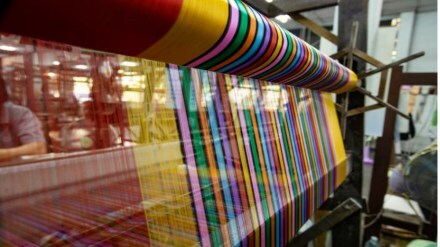By Chandrakant Patil
India is home to one of the largest textile industries in the world – holding 4% of the global textile and apparel market share, contributing 2% to the country’s Gross Domestic Product (GDP), and employing over 45 million people directly (making it the second largest employer in the country), the industry is projected to achieve US$250 billion in textile production by 2030.
The textile industry has assumed a substantial impetus over the past five years, with numerous central government strategies thrusting upon enhancing India’s role as a global textile producer, basis the 5F vision of “Farm to Fibre to Factory to Fashion to Foreign”. Through initiatives like the Production Linked Incentive (PLI) Scheme for Textiles, Kasturi Cotton Bharat programme, National Technical Textiles Mission (NTTM), SAMARTH, and PM Mega Integrated Textile Region and Apparel (PM MITRA) Parks Scheme, the textile industry has undergone a substantial facelift. Drawing from India’s ambitious endeavours to achieve US$100 billion in exports by 2030, Maharashtra has emerged as a potent contender in driving the country’s textile industry.
Our contribution to the national textile industry is paramount – accounting for 10.4% of the total textile and apparel production and employing over 10% of the total employment in India. Furthermore, the Maharashtra Industrial Development Corporation (MIDC) has expedited the growth of the state’s textile industry with the development of 11 exclusive textile parks, strategically located in areas like Amravati, Thane, Solapur, Kolhapur, Nagpur, Nashik, Pune, and Nandurbar (as of 2020).
Maharashtra: A Potent Textile Player in the Making
With the establishment of the Bombay Spinning and Weaving in 1854 – commemorating India’s expansion into the modern cotton industry – Maharashtra marked its place in the country’s textile industry for decades to come, contributing to 60% of the cotton mills in the 1870s.
Owing to our geographical positioning – with sprawling fertile soil for cotton (leading the national cotton acreage with 39.41 lakh ha), and access to extensive coastline (the state has a total of 50 ports) – we are furthering our efforts in increasing the state’s stakes as a leading textile centre as we prepare to establish a garment trading hub in Mumbai, giving it a competitive edge alongside China’s Guangzhou and Turkey’s Istanbul.
As we continue retain a host of intrinsic features that deepens our potential as a textile hub, a robust focus on policies and interventions also remains fundamental in strengthening our infrastructural capacities to facilitate Maharashtra’s growth as a global textile hub.
In the recent times, the state’s exponential efforts in revolutionising the textile industry paved the way towards recognition at the national front, as we become one of the seven recipients of the PM MITRA Park Scheme – to be established in Amravati – projecting to attract INR 10,000 crore and create direct and indirect employment opportunities for nearly 300,000 people. The PM MITRA Park, which would be developed by Maharashtra Industries Development Corporation (MIDC), and funded by the central government, aims to ease business operations for investors by establishing the entire infrastructure under the state government – allowing investors to kickstart their operations.
Advancing its vision of establishing itself as a textile hub, we have further committed to developing 18 mini textile parks – aiming to attract INR1,800 crores as investment and providing employment opportunities to 36,000 individuals.
Progress in the State’s Textile Industry
To emerge as the leading textile hub, the recently released Integrated and Sustainable Textile Policy 2023-2028 manifests our stringent efforts in fostering robust conditions to attract investments, strengthen economic growth, and create significant/massive employment opportunities within the state – positioning it as a key player in the global textile market. To enhance the textile and apparel industry in the state, the Policy aims to promote its textile value chain via technological upgradation and envisages to attract a staggering INR 25,000 crore investment, increasing the production of cotton to 80%, while creating over 5 lakh job opportunities in the next 5 years. Further, the development of six technical textile parks, enhancement of research and development to implement sustainable innovations, with additional emphasis on utilising information technology (IT) to promote ease of doing business, and augment skill development to ensure adequate skilled manpower in the industry, demonstrates our commitment to completely transform the state’s textile sector.
As Maharashtra embarks on its journey to becoming a global textile hub, the transformative and inclusive Integrated and Sustainable Textile Policy is destined to unlock the state’s true potential.
The author is Minister of Textiles, Government of Maharashtra.
Disclaimer: Views expressed are personal and do not reflect the official position or policy of Financial Express Online. Reproducing this content without permission is prohibited.
